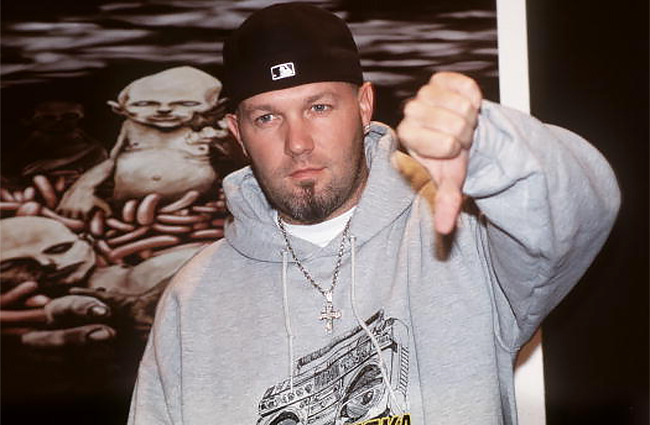
Chocolate Starfish and the Hot Dog Flavored Water. Arguably one of the worst album names for one of the worst albums ever made, thanks to one of the worst bands to ever exist. But here I am today, a 23-year-old who was once obsessed with this album and listened to “My Way” almost every day as a preteen, to say this: I still like Chocolate Starfish and the Hot Dog Flavored Water.
To say that you like a Limp Bizkit album (and that you like Limp Bizkit at all) will always be perceived with some condemnation. For the longest time, one of my best friends thought I was being ironic when I would say, “I’m down with the Bizkit.” This year, he finally realized I was serious.
But getting people to understand the appealing absurdity of Limp Bizkit is a challenge, because the band fed into people’s preconceived notions of them, rather than challenged them. And when I say the band, I mean frontman Fred Durst. After all, the first half of the album title refers to Durst being called an asshole by anyone and everyone during the band’s period of mainstream success. The outro of the album (arguably one of the best parts) even features a discussion between Durst and Ben Stiller that perfectly captures what people loved and hated about the band.
Durst: What do you like about us?
Ben Stiller: I like that you’re so f*cking out there with your message of, you know, “Shut the f*ck up, man. Watch out, Mom. Big bad rockstar.”
Durst: Are you serious?
Ben Stiller: Oh, I can slash your ass with a chainsaw. I’m just saying the message of being able to slash someone’s ass. That’s a good message to put out there.
The exchange is so tongue-in-cheek, you can’t help but wonder, Is Limp Bizkit aware that they’re the butt of their own joke? Is Limp Bizkit smarter than we’re giving them credit for? Do they even care?
And here lies the problem with Limp Bizkit: We never knew how seriously we should take them, because we never knew how seriously they took themselves. Durst’s #DGAF persona (both off and onstage) served as a crutch for the group which inevitably overshadowed everybody’s contributions. Chances are, you dislike (and even hate) Limp Bizkit mostly because of Durst, as opposed to the band itself. Some people feel the same way about Guns N’ Roses, Smashing Pumpkins, and many other bands with divisive frontmen.
Chocolate Starfish was the best Limp Bizkit album because it showed what the group was capable of. Guitarist Wes Borland was essentially the band’s Buckethead or Les Claypool, balancing eccentricity with a guitar style that was wild and memorable, while Sam Rivers (bass), John Otto (drums) and DJ Lethal (turntables and sound programming) created a musically diverse and tight rhythm section that unfortunately doesn’t get as much credit as it deserves.
Then there’s Durst, the energetic and outspoken lead singer who could never catch a break. Sure, most of the singer’s lyrical content was angsty in a comically self-loathing way. But if there’s anything redeemable about Durst’s lyrics, it’s that he understood that sometimes the best catharsis is to yell “f*ck” as much as humanly possible.
And that juxtaposition, between Durst’s lyrics and the contributions of the rest of the band, is what made them interesting while simultaneously leading to their downfall. You could tell who they were trying to emulate: Nine Inch Nails, Rage Against the Machine, Faith No More, and Primus (among many others). But unlike those groups, the lyrics and vocal delivery didn’t really seem to complement the complexities and intricacies of the instrumentation.
What Durst presented felt like something out of a journal: Raw and uncensored, but lacking any commentary or depth that took his subject matter further. All you’re left with is a pissed-off dude who’s mad about anything and everything for no real reason, which is great when you’re a teen, but quickly becomes dated.
But even despite that, 15 years later, I still like Chocolate Starfish. I don’t find Durst’s overt explicitness as enjoyable as I once did, but I still can appreciate the unhinged rawness of it all. I also appreciate what he attempted to do with his vocal delivery, alternating between different voices similar to what you would hear from most contemporary rappers. I still believe that the rest of the band were unsung heroes, especially Borland. Revisiting songs like “My Way” or “The One,” you hear Borland’s knack for bringing rough riffs and beautiful melodies together. But, most importantly, I appreciate them for being a fun band:; a group that made you feel like you chugged six Mountain Dew cans-straight, and were ready to take on the world.
Limp Bizkit will unfortunately be remembered for all of the wrong reasons — a band made up of many things we like about other bands, but never quite made it work. They’ll always have a special place in my heart for that particular reason, too, for being the group that never really made sense, and laughed to the bank for as long as they could until the jig was up.






